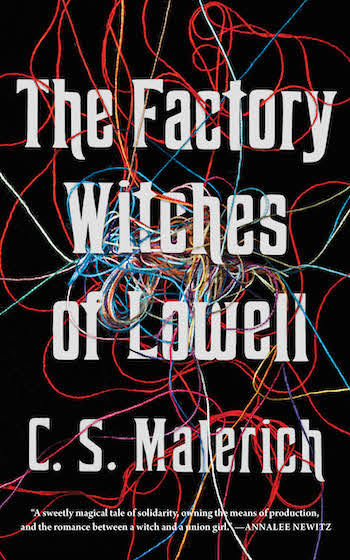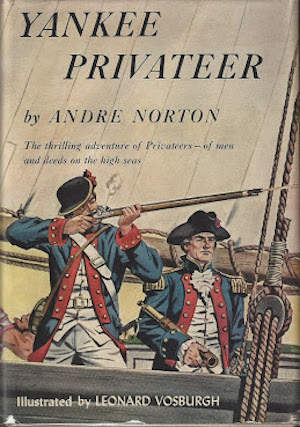The more Andre Norton I read and reread, the more convinced I am that her real forte, and her real talent, lay in boys’ adventure. She tried all sorts of genres, and from the Sixties onward she developed a clearly feminist sensibility. My favorite works of hers have strong female protagonists and relatively complicated emotional arcs.
And yet, she seems most at ease in worlds with little or no sexual tension, and nothing to distract from the headlong pace of the action. Usually it’s a man’s world, with women’s voices heard seldom if at all. Women exist to die offstage (especially if they’re the protagonist’s mother) or to act as servants or to play the role of witch or Wisewoman. The relationships that matter are between men.
Yankee Privateer, published in 1955, is a relatively rare excursion into straight historical fiction.
It reads to me like Hornblower Lite. Maybe she had read the first volume of the saga (published in 1950) and been inspired. Or maybe it was in the Zeitgeist.
Norton was no C.S. Forester and I don’t think aspired to be, but she did quite a lot of research and made sure to mention it in her front matter. Each chapter header is an excerpt from a song of the period. There are plenty of the tiny, telling details that define a period and encourage the reader to trust that the author has done her homework properly.
The protagonist is her standard-issue plucky orphan pushed through a series of adventures by forces beyond his control. This version is named Fitzhugh Lyon, and he’s the son of an English aristocrat and the daughter of a wealthy Maryland family. He’s been raised as a poor relation, and as the story begins, he’s riding his mare and toting his long rifle northward to join the American Revolutionary army.
Fate however has other plans for him. When he stops for the night, he runs afoul of a naval officer recruiting for a privateer. After he refuses the offer, by another quirk of fate he finds himself lodged with the captain himself. He still insists on heading for the land army—but ends up being press-ganged and hauled off to the ship.
That is not the stalwart young captain’s idea, but that of his lieutenant who has taken a violent dislike to poor Fitz. By the time it’s sorted out, the Retaliation is at sea and the only way Fitz can get back to the mainland is by signing on as a marine and hoping to be sent home either with a prize crew or from the next port of call, which happens to be on the far side of the Atlantic.
There’s a hole in the plot, in that Fitz never makes an effort to ship on any of the prizes captured during an exceptionally lucky voyage. He hangs in until they get to Brittany, then through a series of mishaps and misadventures, ends up back on the ship and being taken captive during a naval battle in the English Channel. This deposits him in prison, from which he and his captain make a daring and clever escape—but fate continues to play games with him. He’s separated from the captain during the escape, and eventually meets his long-lost grandfather and the old man’s dissolute rakehell heir.
Buy the Book


The Factory Witches of Lowell
Despite strong pressure from his grandfather, Fitz has absolutely no desire to depose the heir and take his place, and nothing he sees of the family or its holdings changes his mind. They’re horrible and he’s horrified. All he wants to do is get back to the Americas.
Or so he thinks. Once he has a real, actual choice, he opts to sign on permanently with his doughty captain, and become a wholehearted, fully voluntary Yankee Privateer. And so they sail off together into the sunset.
As happens more often than not in Norton’s all or mostly male universes, there’s a distinct undertone of male-male romance. When Fitz first meets the captain, he reacts physically the way a romance heroine does on meeting the hero. Of course he never comes out and expresses his feelings, but it’s clear he’s in love, and he follows his love literally through hell and high water. It’s presented as the loyalty of a naval officer for his captain, but let’s face it, that’s not all that’s going on there.
There’s an obligatory bit of of-its-time discomfort—before Fitz went off to war, he earned his keep by serving as an overseer on the family plantation—but the way he expresses it is pretty accurate for the period, and he’s not blatantly racist. He has no problem interacting with the free Black man in the ship’s crew, and there’s a reference to the horrors of a slave ship. As these things go, it’s fairly inoffensive.
All in all it’s a solid example of its genre. There’s a sort of sequel, Stand and Deliver, published in 1984, which I’ll tackle next. It will be interesting to see how the two compare.
Judith Tarr’s first novel, The Isle of Glass, appeared in 1985. Since then she’s written novels and shorter works of historical fiction and historical fantasy and epic fantasy and space opera and contemporary fantasy, many of which have been reborn as ebooks. She has even written a primer for writers: Writing Horses: The Fine Art of Getting It Right. She has won the Crawford Award, and been a finalist for the World Fantasy Award and the Locus Award. She lives in Arizona with an assortment of cats, a blue-eyed dog, and a herd of Lipizzan horses.











For anyone interested in boy adventures, I recommend Manly Wade Wellman’s books from that period.
My gaydar has never gone off in Norton’s books because she’s one of the most sexless writers I’ve ever read. Nor does she have that much of any emotion as far as that goes. She’s all about plot and big ideas. Boy adventures really don’t require that much emotion so they certainly fit her personality.
another good boys adventure writer is Stephen Meader- both historical and modern (up to the 1960’s). Plus, for the dog and horse fan, there’s Jim Kjelgaard.
It probably wouldn’t be surprising to have free Black crew members on a ship in the late 18th Century; the stark contrast in ships — especially naval ships (which privateers vaguely aspired to be) — was between officers and crew. See, for some background, https://www.pbs.org/wgbh/aia/part2/2p51.html and https://usnhistory.navylive.dodlive.mil/2018/02/27/americas-first-black-sailors/
This isn’t to say that there was some magical equality present afloat that there wasn’t ashore; Blacks were locked out of the officer class, although it’s possible that some would be warrant officers (boatswains, carpenters, pursers, etc) and petty officers (masters of arms, gunners, sailmakers, etc). Sailing warships were very complex machines, requiring large numbers of skilled crew members for the operation of the ship and its weapons.
A visit to a full-rigged ship would help one appreciate that. There are a few museum warships about, such as the USS Constitution in the US and the HMS Victory in Britain. There are also some merchant ships surviving, like the Cutty Sark and Charles W. Morgan.
So there’s this one, the two Civil War era novels, and the pirate novel, SCARFACE. Any other historical fiction, non Gothic books from her? Was that late in life Chinese history (IIRC) inspired one actually histiorical, I don’t remember.
And @1, I’m with you she didn’t do sexual interest really. Although I have wondered if reading a lot of her before I read LOTR is what trained me to spot Aragorn and Arwen as a thing, with just two clues in Fellowship.
And Shadow Hawkl, the Egyptian-set one.
Just to clarify, the protagonist was press-ganged by an American crew onto a privateer in US service, rather than a Loyalist cruiser? (The cover image you’ve posted makes it more explicit, but your review of the plot does not specifically mention which side young Lyon falls in with; he wouldn’t be the first American impressed into His Britannic Majesty’s Service … nor, for that matter, the last*).
*Mr President Madison had something to say about that circa AD 1812; things didn’t go very well for him personally, but otherwise honours seem to have been more or less even in the argument that followed.
@1, sexless yes but she does male/male romance a lot more convincingly than male/female.
@7 My parents were of her generation and background, and even the idea of an implied male/male romance would never have entered their minds. My mom in her Seventies was stunned when I mentioned that the man in her church class who handled the flowers for my brother’s wedding was obviously gay. Utterly clueless. But she was accepting so it didn’t change her opinion of him. I’m sticking with my idea that Norton was as clueless.